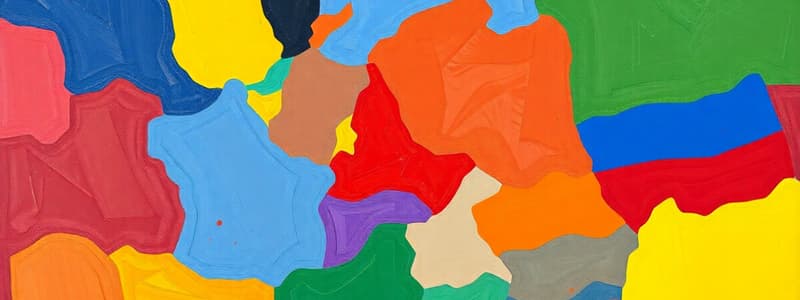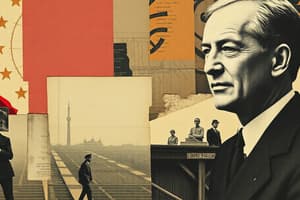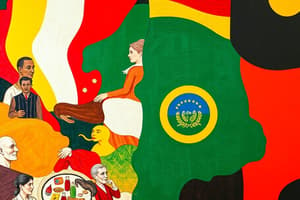Podcast
Questions and Answers
What is a nation-state?
What is a nation-state?
- A political entity without defined boundaries.
- An organized area where a nation and a state occupy the same space. (correct)
- A community of people with a common culture.
- A territory with multiple nations coexisting.
Which of the following best describes national identity?
Which of the following best describes national identity?
- The total absence of cultural ties among a community.
- A collection of people sharing a sense of culture tied to a territory or history. (correct)
- A concept related solely to language differences.
- An individual's personal beliefs about their heritage.
What are imagined communities characterized by?
What are imagined communities characterized by?
- Constructed identities based on belonging to specific communities. (correct)
- Concrete geographical boundaries established through treaties.
- Shared essentialized identities tied purely to economic status.
- Physical landmarks that define cultural differences.
Which term refers to the lines of contact between states?
Which term refers to the lines of contact between states?
What does 'perception' refer to in the context of human geography?
What does 'perception' refer to in the context of human geography?
How are absolute locations defined?
How are absolute locations defined?
What does topophilia refer to?
What does topophilia refer to?
What is the primary focus of chorology in human geography?
What is the primary focus of chorology in human geography?
What is a sacred place primarily characterized by?
What is a sacred place primarily characterized by?
How is placelessness best described?
How is placelessness best described?
What defines a state in political geography?
What defines a state in political geography?
What does sovereignty refer to in the context of a state?
What does sovereignty refer to in the context of a state?
What is the main focus of political geography?
What is the main focus of political geography?
What is the goal of anticolonial movements?
What is the goal of anticolonial movements?
What is the basis of decolonization?
What is the basis of decolonization?
What does Orientalism articulate according to Edward Said?
What does Orientalism articulate according to Edward Said?
Flashcards are hidden until you start studying
Study Notes
Nation-state
- A nation-state is when a nation and a state occupy the same space.
- It’s a common aspiration for both nations and states, but rarely achieved.
- It can be used interchangeably with state or country.
Nation
- A nation is a community of people held together through a sense of solidarity.
- People within a nation share a historical connection to a homeland and a common culture.
- They are defined by their distinctions between other nations.
National Identity
- National identity is a collective of people who share a sense of culture.
- This shared culture is connected to their identification with a territory or place, and their shared history.
- They may share religious beliefs, language, ethnicity, a shared understanding of history, etc.
Imagined community
- Imagined communities are constructed through essentialized identities based on belonging to a particular place or community group.
- Nations are considered imagined communities.
Boundaries
- Boundaries are physical or imaginary lines of contact between states.
- They include the social institutions and symbols that exist in social practices and discourses.
Borders
- Borders are the areas adjacent to boundaries.
Perception
- Perception is the process by which humans acquire information about their physical and social environments.
- It is how we interpret our lived experiences subjectively.
Locations
- Absolute locations are precise locations pinpointed on a global grid system, like using longitude and latitude
- Relative locations use other sites as reference points to describe a location (e.g., Calgary is 300 km south of Edmonton)
- Nominal locations are common location names.
Topophilia
- Topophilia is an emotional bond between people and place.
- It’s about our mental, emotional, and cognitive ties to a place.
Chorology
- The study of regions and places.
Sacred place
- A location that has a specific significance to an individual or group, usually for spiritual or religious reasons.
Placelessness
- Placelessness describes locations that lack uniqueness or individual character.
- It describes homogenous and standardized landscapes, like big-box stores.
Vernacular region
- An area defined based on the perception of those inside or outside the region, or both.
Cultural landscape
- The overall appearance of a particular area, resulting from human modification of the natural environment.
State
- A politically organized entity administered by a sovereign government.
- It’s recognized by a significant portion of the international community.
- A state has a defined territory, a permanent population, and a government.
Sovereignty
- Refers to a state's right to exercise power and control over people in a particular territory.
- This right is recognized by international law.
Territoriality
- Territoriality is the attempt by an individual or group to affect, influence, or control people, phenomena, and relationships by controlling a geographic area.
- It encompasses a sense of property and attachment toward a territory, and the need to protect and defend it.
Political geography
- Political geographers study nations and states, their territories and boundaries, and ideologies of nationalism and sovereignty.
- They also study the geographies of everyday life.
Anticolonial
- Anticolonial movements seek to dismantle colonial systems.
- Associated with anticolonial movements of the 20th century, it is resistance to colonial systems and ideologies.
Decolonization
- Decolonial frameworks question how knowledge is produced and dismantle colonial systems.
- It creates space for alternative knowledge systems, like Indigenous knowledge systems.
Orientalism
- Orientalism explores the colonial production of knowledge about the “Orient” by the “West” through stories, images, and ideas.
- It's about representation of “Oriental” people, places, and cultures through a “Western” lens.
Multiple Choice Questions
- Question 1:* Which of the following BEST describes a nation-state? (a) A territory with a homogenous population. (b) A politically organized area with a defined territory, population, and sovereignty. (c) A community of people sharing a common culture and homeland. (d) A politically organized area where a nation and state coincide.
- (d)*
- Question 2:* What is NOT a characteristic of a nation? (a) Shared history. (b) Common culture. (c) Shared religious beliefs. (d) A defined territory with a government.
- (d)*
- Question 3:* What is the term for a community imagined based on shared identity and place? (a) National identity. (b) Nation-state. (c) Imaginary community. (d) Imagined community
- (d)*
- Question 4:* Boundaries are described as: (a) Lines of contact between areas. (b) Areas next to boundaries. (c) A sense of property and attachment to an area. (d) Shared cultural norms and practices.
- (a)*
- Question 5:* Which of the following BEST describes the concept of Topophilia? (a) The study of regions and places. (b) An emotional connection between people and place. (c) The process by which humans interpret their environment. (d) The homogenization of landscapes.
- (b)*
- Question 6:* Which of the following is NOT a type of location? (a) Absolute. (b) Topophilia. (c) Relative. (d) Nominative.
- (b)*
- Question 7:* Placelessness reflects: (a) Landscapes that are unique and distinctive. (b) A sense of belonging to a particular place. (c) Standardized and homogenous landscapes. (d) Landscapes that are sacred and important to local communities
- (c)*
- Question 8:* A sovereign state has the right to: (a) Control the movement of people and goods across its territory. (b) Influence other states through economic means. (c) Establish a strong military to defend its borders. (d) Intervene in the affairs of other states.
- (a)*
- Question 9:* What is the main objective of anticolonial movements? (a) To promote Westernization and modernization in colonized territories. (b) To dismantle colonial systems and ideologies. (c) To establish new forms of governance based on local traditions. (d) To create independent nation-states free from all foreign influence
- (b)*
- Question 10:* What is the key focus of Decolonization? (a) To challenge the way we understand, produce, and validate knowledge. (b) To establish a global system of governance based on equal representation. (c) To return control of resources to former colonial powers. (d) To promote economic development in former colonies
- (a)*
Studying That Suits You
Use AI to generate personalized quizzes and flashcards to suit your learning preferences.




